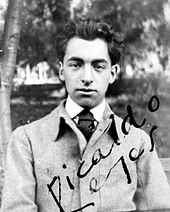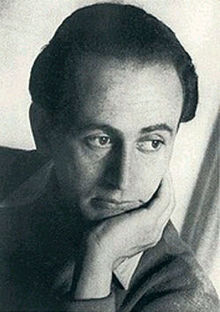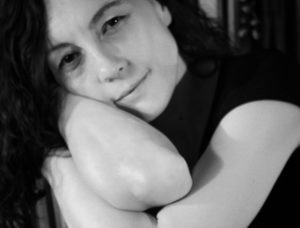
GUADALUPE GRANDE
Madrid, 1965.
She has written the following books of poetry: El libro de Lilit (1995), La llave de niebla (2003), Mapas de cera (2006) and Hotel para erizos (2010).
She has been translated into French in the book Métier de crhysalide (translation by Drothèe Suarez and Juliette Gheerbrant (2010) and into Italian, in the volume Mestiere senza crisalide (translation by Raffaella Marzano (2015). She made the selection and translation of La aldea de sal (2009), an anthology of Brazilian poet Lêdo Ivo, together with poet Juan Carlos Mestre.
Her creative work extends to the territory of photography and visual poetry.http://guadalupegrande.blogspot.com.es/
Key of Mist is an excerpt from the collected poems Key of Mist
 KEY of MIST
KEY of MIST
I
Behind the fence there´s a ditch
and behind the ditch
there´s a chest devastated by the journey.
Who arrives here and how
and after perhaps?
Who arrives and says and names
and leaves their hands stuck to this fence
as stamps are stuck to envelopes,
to return where
to return to then
to return to later, never again?
The compass rose rolls amongst the rubble,
rolls on the banks of gravel,
on the edge of ash,
and leaves its petals of distance,
its shipwreck of durum-wheat and pollen,
beneath the wheels of the car which has just passed.
Time for the word time
amidst the rubble of the tower of babel.
II
But now there´s the ditches:
water ditches
light ditches
gas ditches
ditches for words.
I am spelling
while telling myself
that it can´t be today,
that there is too much rush,
that life´s a disaster
or nonsense
or a useless disquiet,
and due to that, today there´s no time:
time for nothing, time for what.
III
I open the door, switch on the light,
turn on the tap:
I´d like to know whom to call.
The sound of traffic enters through the window;
I hear the rumours of travellers
I listen to the sound of the inhabitants
and builders
of this language without words.
IV
I speak in gurgles
as if a key of mist
were laid across my throat,
a key fogged up by noise,
a key flooded by light,
a gas key
a water key
a doorless key,
a definitely shadowy key
buried inside my throat,
in the ditch of my bewildered throat.
V
Behind each fence there is a ditch,
behind each ditch there is a journey.
The compass rose crosses
the city tunnels:
from its smoky petals it brings
forth mossy farewells,
the empire of forget-me-nots,
paper for unwritten letters,
humiliated stamps
and a devastated chest in the building
of music
or language
or city noise.
Under the asphalt of these roads
the tower of babel grows
sad and useful.
VI
I turn on the tap in the kitchen and while water runs through the sink I wonder which words this thread of order and cleanliness is spelling, which key I should switch to, to understand the language of fences, the language of ditches, the underground sound of migrating birds opening without any key this city´s gates, without a key, at last, at last.
LA LLAVE DE NIEBLA
I
Detrás de la valla hay una zanja
y detrás de esa zanja
hay un pecho desolado en el viaje.
¿Quién llega hasta aquí y cómo
y luego tal vez?
¿Quién llega y dice y nombra
y deja sus manos pegadas a esta valla,
como se pegan los sellos a las cartas,
para volver a dónde
para volver a entonces
para volver a luego nunca más?
Rueda la rosa de los vientos por los escombros,
rueda a la orilla de la grava,
al borde de la ceniza,
y deja sus pétalos de distancia,
su polen náufrago y candeal,
bajo las ruedas del coche que acaba de pasar.
Tiempo para la palabra tiempo
entre los escombros de la torre de babel.
II
Pero ahora están las zanjas:
zanjas de agua,
zanjas de luz,
zanjas de gas,
zanjas para las palabras
que pronuncio
mientras me digo
que hoy no puede ser,
que hace mucha prisa,
que la vida es un desastre
o un disparate
o un desasosiego inútil,
debido a lo cual hoy no hay tiempo:
tiempo para nada, tiempo para qué.
III
Abro la puerta, enciendo la luz,
abro el grifo:
quisiera saber a quién llamar.
Entra el sonido del tráfico por la ventana;
oigo el rumor de los viajeros,
escucho el sonido de los habitantes
y de los constructores
de este idioma sin palabras.
IV
Hablo a borbotones,
como si tuviera una llave de niebla
atravesada en la garganta,
una llave empañada por el ruido,
una llave anegada por la luz,
una llave de gas,
una llave de agua,
una llave sin puerta,
una llave definitivamente umbría,
enterrada en mi garganta,
en la zanja de mi desconcertada garganta.
V
Detrás de cada valla hay una zanja,
detrás de cada zanja hay un viaje.
La rosa de los vientos cruza
los túneles de la ciudad:
trae entre sus pétalos de humo
el musgo de las despedidas,
el imperio de los nomeolvides,
papel para cartas no escritas,
humillados sellos
y un pecho desolado en la construcción
de la música
o el lenguaje
o el ruido de la ciudad.
Bajo el asfalto de estas calles
crece la torre de babel
triste y útil.
VI
Abro el grifo en la cocina
y mientras corre el agua por el fregadero
me pregunto qué palabras pronuncia
este hilo de orden y limpieza,
qué llave debo abrir para entender
el lenguaje de las vallas, el idioma
de las zanjas,
el sonido subterráneo
de las aves migratorias
que abren sin llave alguna las puertas de esta ciudad,
sin llave,
por fin,
por fin.
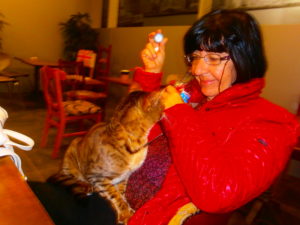
Amparo Arróspide (Argentina) has published five poetry collections: Presencia en el Misterio, Mosaicos bajo la hiedra, Alucinación en dos actos y algunos poemas, Pañuelos de usar y tirar and En el oído del viento, as well as poems, short stories and articles on literature and films in anthologies and international magazines. She has translated authors such as Francisca Aguirre, Javier Díaz Gil, Luis Fores and José Antonio Pamies into English, together with Robin Ouzman Hislop, who she worked with for a period as co-editor of Poetry Life and Times, a Webzine. Her translations into Spanish of Margaret Atwood (Morning in the Burned House), James Stephens (Irish Fairy Tales) and Mia Couto (Vinte e Zinco) are in the course of being published, as well as her two poetry collections Hormigas en diáspora and Jacuzzi. She takes part in festivals, recently Transforming with Poetry (Leeds) and Centro de Poesía José Hierro (Getafe).
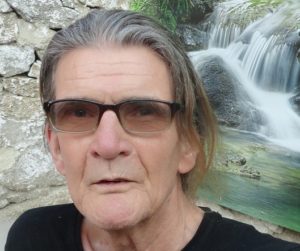
Robin Ouzman Hislop is on line Editor at Motherbird.com, Artvilla.com & Poetry Life & Times, his recent publications include Voices without Borders Volume 1 (USA), Cold Mountain Review (Appalachian University, N.Carolina), The Poetic Bond Volumes, Phoenix Rising from the Ashes (an international anthology of sonnets) and The Honest Ulsterman. His last publications are a volume of collected poems All the Babble of the Souk & Key of Mist, a translation from Spanish of the poems by the Spanish poetess Guadalupe Grande, both are published by Aquillrelle.com and available at all main online tributaries. For further information about these publications with reviews and comments see Author Robin..
www.facebook.com/PoetryLifeTimes
www.facebook.com/Artvilla.com
robin@artvilla.com
editor@artvilla.com
Key of Mist. Guadalupe Grande.Translated.Amparo Arróspide.Robin Ouzman Hislop
goodreads.com/author/show/Robin Ouzman Hislop
http://www.aquillrelle.com/authorrobin.htm
http://www.amazon.com. All the Babble of the Souk. Robin Ouzman Hislop
www.lulu.com. All the Babble of the Souk. Robin Ouzman Hislop
https://www.amazon.com/author/robinouzmanhislop
http://www.innerchildpress.com/robin-ouzman-hislop.All the Babble of the Souk


